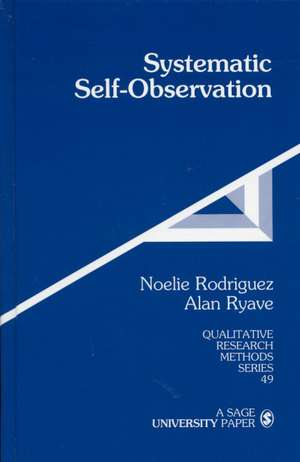Systematic Self-Observation: A Method for Researching the Hidden and Elusive Features of Everyday Social Life: Qualitative Research Methods, cartea 49
Autor Noelie Maria Rodriguez, Alan Lincoln Ryaveen Limba Engleză Paperback – 30 ian 2002
Din seria Qualitative Research Methods
-
 Preț: 271.07 lei
Preț: 271.07 lei -
 Preț: 305.18 lei
Preț: 305.18 lei -
 Preț: 304.73 lei
Preț: 304.73 lei -
 Preț: 273.68 lei
Preț: 273.68 lei -
 Preț: 304.17 lei
Preț: 304.17 lei -
 Preț: 271.07 lei
Preț: 271.07 lei -
 Preț: 306.42 lei
Preț: 306.42 lei -
 Preț: 305.60 lei
Preț: 305.60 lei -
 Preț: 306.14 lei
Preț: 306.14 lei -
 Preț: 304.77 lei
Preț: 304.77 lei -
 Preț: 306.69 lei
Preț: 306.69 lei -
 Preț: 304.51 lei
Preț: 304.51 lei -
 Preț: 305.03 lei
Preț: 305.03 lei -
 Preț: 134.60 lei
Preț: 134.60 lei -
 Preț: 288.79 lei
Preț: 288.79 lei -
 Preț: 290.33 lei
Preț: 290.33 lei -
 Preț: 287.82 lei
Preț: 287.82 lei -
 Preț: 290.54 lei
Preț: 290.54 lei -
 Preț: 289.56 lei
Preț: 289.56 lei -
 Preț: 288.04 lei
Preț: 288.04 lei - 18%
 Preț: 715.81 lei
Preț: 715.81 lei -
 Preț: 291.07 lei
Preț: 291.07 lei -
 Preț: 290.69 lei
Preț: 290.69 lei -
 Preț: 288.41 lei
Preț: 288.41 lei -
 Preț: 289.18 lei
Preț: 289.18 lei -
 Preț: 317.26 lei
Preț: 317.26 lei -
 Preț: 288.19 lei
Preț: 288.19 lei -
 Preț: 290.33 lei
Preț: 290.33 lei -
 Preț: 290.69 lei
Preț: 290.69 lei -
 Preț: 317.10 lei
Preț: 317.10 lei -
 Preț: 315.75 lei
Preț: 315.75 lei -
 Preț: 290.69 lei
Preț: 290.69 lei -
 Preț: 290.33 lei
Preț: 290.33 lei -
 Preț: 315.36 lei
Preț: 315.36 lei -
 Preț: 290.54 lei
Preț: 290.54 lei -
 Preț: 290.69 lei
Preț: 290.69 lei -
 Preț: 290.69 lei
Preț: 290.69 lei -
 Preț: 291.07 lei
Preț: 291.07 lei -
 Preț: 270.69 lei
Preț: 270.69 lei -
 Preț: 289.77 lei
Preț: 289.77 lei -
 Preț: 288.04 lei
Preț: 288.04 lei -
 Preț: 289.95 lei
Preț: 289.95 lei -
 Preț: 270.54 lei
Preț: 270.54 lei -
 Preț: 288.19 lei
Preț: 288.19 lei -
 Preț: 270.54 lei
Preț: 270.54 lei -
 Preț: 316.12 lei
Preț: 316.12 lei
Preț: 315.53 lei
Nou
Puncte Express: 473
Preț estimativ în valută:
60.38€ • 63.21$ • 49.96£
60.38€ • 63.21$ • 49.96£
Carte tipărită la comandă
Livrare economică 07-21 aprilie
Preluare comenzi: 021 569.72.76
Specificații
ISBN-13: 9780761923084
ISBN-10: 076192308X
Pagini: 80
Dimensiuni: 140 x 216 x 5 mm
Greutate: 0.11 kg
Ediția:1
Editura: SAGE Publications
Colecția Sage Publications, Inc
Seria Qualitative Research Methods
Locul publicării:Thousand Oaks, United States
ISBN-10: 076192308X
Pagini: 80
Dimensiuni: 140 x 216 x 5 mm
Greutate: 0.11 kg
Ediția:1
Editura: SAGE Publications
Colecția Sage Publications, Inc
Seria Qualitative Research Methods
Locul publicării:Thousand Oaks, United States
Cuprins
Acknowledgments
Series Editors' Introduction
Foreword - H. Schwartz
1. Introducing Systematic Self-Observation
A Brief Description of Systematic Self-Observation
The Theoretical and Methodological Bases for Systematic Self-Observation
A Brief Review of Social Science Endeavors at Self-Observation
How Systematic Self-Observation Contrasts With the Other Self-Observation Methods
2. Implementing Systematic Self-Observation
Choosing the Subject Matter for Study
Formulating the Topic
Recruiting Informants
Guiding Informants to Be Scientific Observers
Teaching Informants How to Observe
Teaching Informants How to Report Self-Observations
Preparing Informants With Training Exercises
Ethical Considerations
Feedback on Systematic Self-Observation
3. A Critical Evaluation of Systematic Self-Observation
Problems in Choosing the Informants
Problems in Framing and Delivering the Instructions
Problems in Observing the Phenomenon
Problems in Recallign and Reporting the Phenomenon
Strengths of the Systematic Self-Observation Method
4. Four Studies Generated With Systematic Self-Observation
Case Study 1: Telling Lies in Everoyday Life
Case Study 2: The Micropolitics of the Secrets Told in Everyday Life
Case Study 3: Withholding of Compliments and the Covert Management of Disaffiliation
Case Study 4: Envy in the Social Comparisons of Everyday Life
Analytic Insights Generated by These Systematic Self-Observation Studies
5. Other Applications of Systematic Self-Observation
Researchable Systematic Self-Observation Topics
Systematic Self Observation as Redagogy
Using Systematic Self-Observation for Therapy
Self-Observation and Self/Spiritual Development Practices
Notes
References
About the Authors
Series Editors' Introduction
Foreword - H. Schwartz
1. Introducing Systematic Self-Observation
A Brief Description of Systematic Self-Observation
The Theoretical and Methodological Bases for Systematic Self-Observation
A Brief Review of Social Science Endeavors at Self-Observation
How Systematic Self-Observation Contrasts With the Other Self-Observation Methods
2. Implementing Systematic Self-Observation
Choosing the Subject Matter for Study
Formulating the Topic
Recruiting Informants
Guiding Informants to Be Scientific Observers
Teaching Informants How to Observe
Teaching Informants How to Report Self-Observations
Preparing Informants With Training Exercises
Ethical Considerations
Feedback on Systematic Self-Observation
3. A Critical Evaluation of Systematic Self-Observation
Problems in Choosing the Informants
Problems in Framing and Delivering the Instructions
Problems in Observing the Phenomenon
Problems in Recallign and Reporting the Phenomenon
Strengths of the Systematic Self-Observation Method
4. Four Studies Generated With Systematic Self-Observation
Case Study 1: Telling Lies in Everoyday Life
Case Study 2: The Micropolitics of the Secrets Told in Everyday Life
Case Study 3: Withholding of Compliments and the Covert Management of Disaffiliation
Case Study 4: Envy in the Social Comparisons of Everyday Life
Analytic Insights Generated by These Systematic Self-Observation Studies
5. Other Applications of Systematic Self-Observation
Researchable Systematic Self-Observation Topics
Systematic Self Observation as Redagogy
Using Systematic Self-Observation for Therapy
Self-Observation and Self/Spiritual Development Practices
Notes
References
About the Authors












